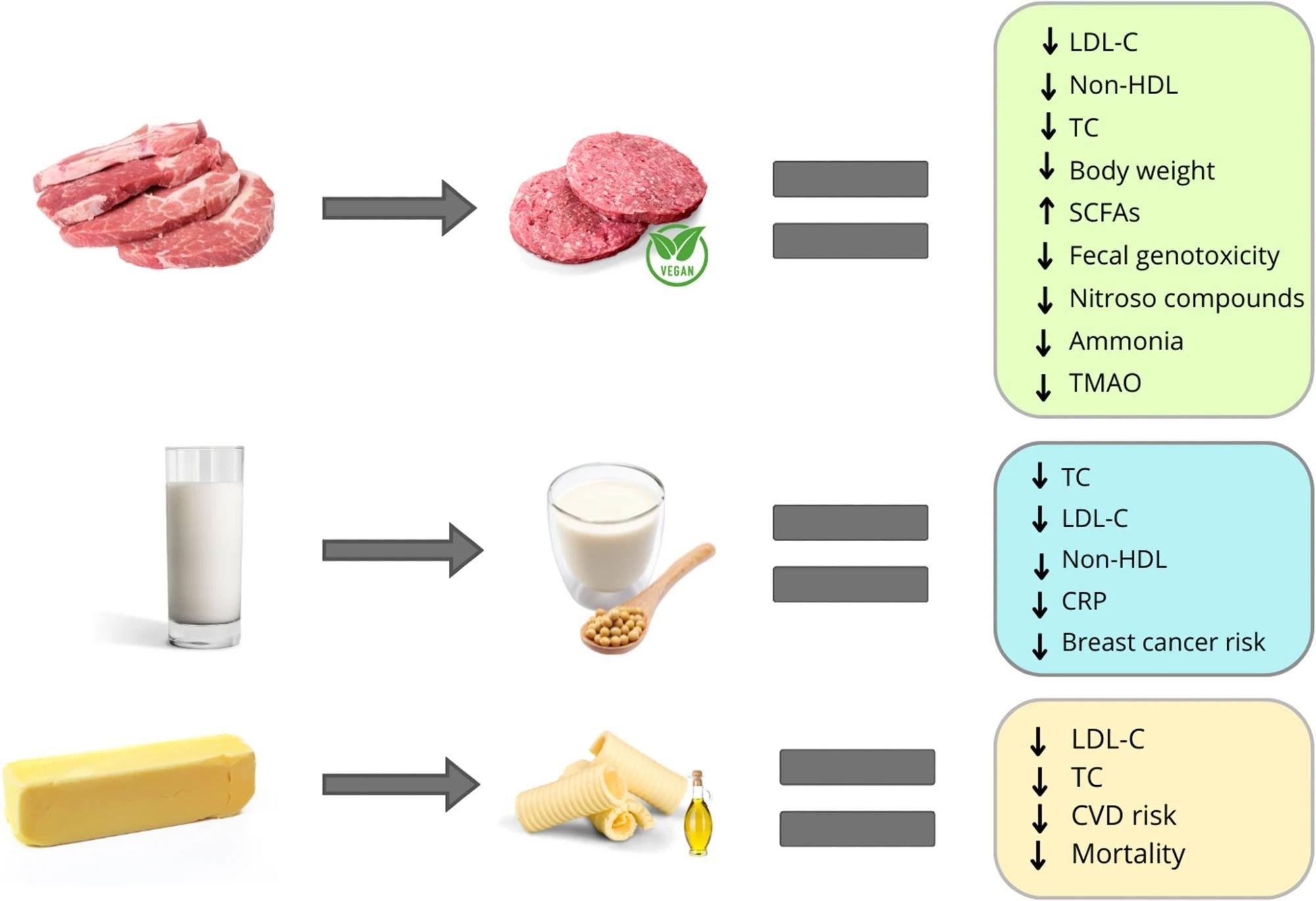Blog
Are ultra-processed plant foods really worse than meat? Scientists weigh
Given the attention to the health risks and benefits of unprocessed versus processed foods, there is a need for a narrative review of this area. A recent narrative review published in a journal examines the comparison of unprocessed animal-derived foods with ultra-processed plant-based foods in terms of their effects on cardiometabolic risk, chronic disease, and mortality.
Entry
The NOVA food classification is divided into four groups: unprocessed/minimally processed foods, culinary ingredients, processed foods, and ultra-processed foods (UPF). UPF can be of animal or plant origin.
UPFs constitute a major part of the modern diet. These are industrially manufactured food products resulting from the breakdown of whole foods, combined with additives and auxiliaries to create new products offered as an alternative to foods or meals from other NOVA categories. UPFs are associated with cardiometabolic diseases with obesity and a greater risk of death.
The UPF category has been criticized as encompassing all products with widely varying health effects. For example, processed meats are UPF high in sodium and nitrates, high in saturated fat and high in cholesterol.
Conversely, mycoprotein-based UPFs are high in protein, but also high in fiber, low in saturated fat, and cholesterol-free. Mycoprotein is a product resulting from the fermentation of mycelium.

Plant-based UPF
Plant-based UPF filters are popular due to the growing demand for more sustainable and healthy foods, as well as ethical concerns among some consumers. These include plant milks, meat analogues and margarine. They do not contain cholesterol and heme iron, they contain less saturated fat, but they also have lower levels of sulfur and branched chain amino acids. They also contain dietary fiber, which is missing in animal foods.
For example, plant-based milk is often classified as UPF. They are made from cereals, pseudo-cereals, seeds, nuts and even tubers, soaked in water and then homogenized. Additives are often present, including enrichment with vitamins, stabilizers, acidity regulators, emulsifiers, added sugars and vegetable oils, added fiber or vegetable protein isolates, and salt or other flavors.
As a result, approximately 84% of all plant milks are considered UPF, 14% are processed, and only 2% are minimally processed. The UPF label for such plant-based foods marks them as less healthy than unprocessed animal-based foods and prevents them from being more widely consumed.
One small, randomized study found that oat milk lowered total i LDL cholesterol within groups, although not significantly compared to cow’s milk, highlighting the product-specific variability of plant milk.
Plant-based meat analogues are available in the form of burgers, minced meat, fake chicken and soy deli slices. An audit of the Spanish market found that most plant-based meat substitutes available on supermarket shelves were ultra-processed, emphasizing the availability of the product rather than actual consumption by the public.
Margarine is a product of partial hydrogenation of vegetable oil and contains trans fatty acids. These ingredients increase the risk of cardiovascular disease and overall mortality. Therefore, in 2015, partially hydrogenated oils were considered dangerous. In the United States, the FDA ban on partially hydrogenated oils went into full effect in 2018.
Newer soft margarine is made from non-hydrogenated vegetable oils, mainly rich in POOFwith which they are associated anti-inflammatory lipid effects and not directly referred to as antioxidant or anti-inflammatory compounds.
Benefits of plant-based UPF
Without a doubt, plant foods that have undergone minimal processing are the healthiest and provide the best health benefits. However, some research shows that replacing soy milk with dairy milk reduces lipid-related risk factors for cardiovascular disease and reduces the risk of breast cancer. Replacing cow’s milk with soy milk with reducedHDL-C, LDL-Cblood pressure and CRPwithout modifying the effect by adding sugars; sweetened soy milk and cow’s milk had similar average sugar contents. Other studies indicate a reduced risk of type 2 diabetes, stomach and breast cancer, and the risk of osteoporosis.
In the Adventist Health Study-2, replacing one serving of cow’s milk with soy milk was associated with a lower risk of breast cancer.
In large European cohorts such as EPICplant-based alternatives showed mixed associations, with no clear link between their consumption and reduction of multimorbidity, highlighting that benefits may depend on the substitution context and product composition.
The use of plant meat analogues is associated with reduced content of total lipoproteins and low-density lipoproteins (LDL) cholesterol and body weight. Their use is associated with lower levels of ammonia in the blood, as well as trimethylamine N-oxide (TMAO). Raised TMAO These levels result from bacterial activity in foods of animal origin and are associated with the risk of cardiometabolic diseases.
Randomized crossover studies have shown replacement of red meat with plant analogues such as Beyond Meat (e.g. CHANGE OF MEAT) to lower LDL-Cbody weight i TMAO. Other plant protein-based UPFs, including soy, pea, and gluten protein analogues, also show promise for replacing animal-based foods, reducing total and LDL cholesterol and increasing the content of dietary fiber. The Portfolio Diet, which combines soy protein products with nuts, viscous fiber and plant sterols, has achieved LDL-C dose reduction comparable to that seen with statin therapy.
Using soft margarine instead of butter lowers the total i LDL cholesterol and replacing butter with margarine is associated with a lower incidence of cardiovascular diseases and mortality. However, the review noted that non-lipid endpoints, such as markers of inflammation or endothelium, show less consistent improvement.
Why these benefits?
The healthy effects of these plant-based UPFs can be explained by the lower concentration of essential amino acids that are enriched in animal proteins. These include branched chain amino acids, methionine and lysine, which in larger amounts cause metabolic disorders.
Animal foods contain cholesterol and much more saturated fat than most plant foods, which raises cholesterol levels risk of atherosclerosis and insulin resistance and causing inflammation. In addition to the lack of these substances, POOF in plant products increase the benefits.
Plant foods, unlike animal foods, also contain dietary fiber, which can lead to the formation of short-chain fatty acids with anti-inflammatory effects and may reduce the potential for pre-cancer. Added thickening and binding agents may also reduce cholesterol absorption and improve blood glucose regulation.
Heme iron in animal meat increases the risk of cancer, type 2 diabetes and deadly cardiovascular disease. Leghemoglobin, obtained from modified yeast, mimics the characteristics of heme and is used in many plant-based meat analogues.
Other mechanisms include lower levels of atherogenic trimethylamine-N-oxide (TMAO). Bioavailable estrogens found in dairy milk are absent in plant-based milk, reducing oncogenic potential.
Conclusions
Plant-based UPFs are less healthy than whole plant foods. However, they may provide better cardiometabolic results than unprocessed animal foods, especially when used as substitutes. They can serve as transition tools in the transition from a meat- and plant-based omnivorous diet to a plant-based diet. “Public health guidance should reflect these nuances to support realistic, health-promoting changes.”
Future research should focus on highlighting the differences between various UPFs and other foods.

